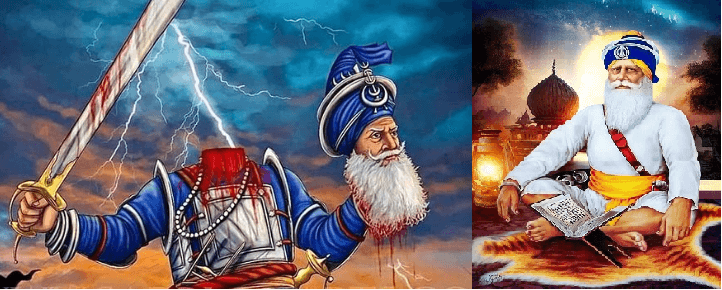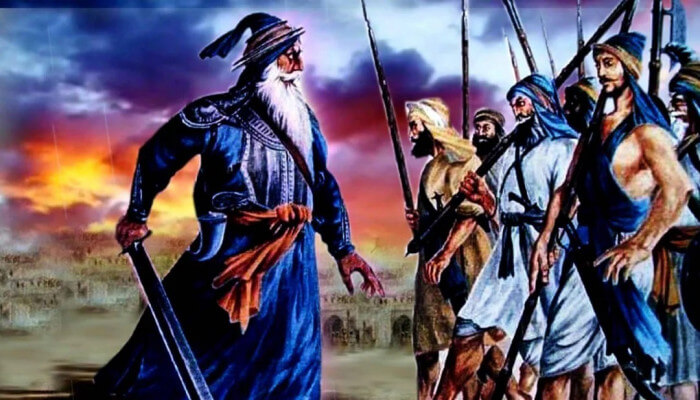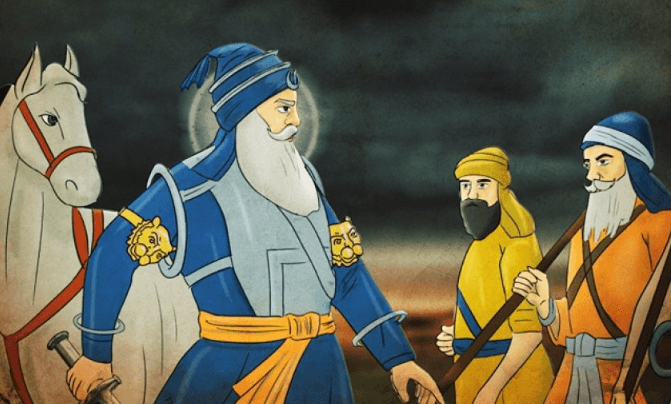
Baba Deep Singh (1682-1757) — was a revered Sikh warrior and one of the most prominent Sikh leaders of the 18th century. He was a close associate of Guru Gobind Singh the tenth Sikh Guru and played a crucial role in the Sikh struggle for freedom and self-preservation. His contributions to Sikhism were not limited to the battlefield but also encompassed the spiritual and educational dimensions of the Sikh community.
Early life and spiritual journey
Baba Deep Singh was born in into a humble Sikh family in village of Pahuwind in Amritsar district of Punjab in 1682. His childhood name was “Deepa” or “Deepa Singh”. “Deepa” in Punjabi means “lamp” or “light” and is symbolic of enlightenment. Both his parents Bhai Bhag Singh and Mata Viro were devout Sikhs. Baba Deep Singh’s early education was centred on the teachings of Guru Nanak, the Guru Granth Sahib (the central religious scripture of Sikhism), and the martial training required to defend Sikh values and community.
His father Bhai Bhag Singh played a significant role in shaping the early life and spiritual development of Deep Singh his son who went on to become a prominent figure in Sikh history. From a young age, Deepa was taught the values of Sikhism, including the belief in one God, equality, selflessness, humility, and service to others. Deepa learned to recite Granth Sahib the sacred scripture and eternal Guru of the Sikhs, which emphasizes meditation on God’s name (Naam Simran), humility, and the rejection of caste, which were central to the teachings of Guru Nanak and the other Gurus.
Also Read: Banda Bahadur: the forgotten Sikh hero
He was taught Gurbani (the hymns of the Gurus) which shed valuable insight on how to live a righteous life. Baba Deep Singh’s early education also included lessons on the struggles faced by the Sikh community under Mughal rule and the history of the Sikh Gurus. The stories of Sikh warriors taught Deepa the value of bravery, courage and sacrifice.
As a young boy, Deepa also learnt the use of weapons, especially the sword and horse riding which played a crucial role in his later life as a Khalsa warriors.
As he matured, Deepa became a devoted follower of Guru Gobind Singh, whose teachings emphasized the need for Sikhs to be spiritually enlightened as well as physically strong. Baba Deep Singh was known to have a strong connection to Guru Gobind Singh.
As he grew older Deep Singh volunteered to became one of the earliest and most dedicated members of the Khalsa order established by Guru Gobind Singh the tenth Sikh Guru on Baisakhi day in 1699.
During those days the Mughal Empire, under Emperor Aurangzeb was harassing the Sikhs and other religious minorities and destroying their places of worship and forcing them to convert and embrace Islam. It was in this atmosphere of oppression that the Khalsa panth was created as a powerful force to protect the Sikh faith.
Also Read: The life and legend of Guru Tegh Bahadur -the 9th Sikh Guru
Combat skills and military campaigns

Baba Deep Singh was a skilled warrior and participated in several battles against the Mughal Empire and other oppressive forces. He was known for his bravery, strategic thinking, and unwavering commitment to the Sikh cause.
Baba Deep Singh’s combat skills particularly expertise with the sword left a lasting impact in various battles and military expeditions against Mughal forces during the early 1700s. As a result, because of bravery and dedication to duty, Deep Singh not only rose up the ranks of the Khalsa army but also earned him the title of “Baba” – a senior or revered person in Sikh culture.
The Battle of Amritsar
Baba Deep Singh’s moment of glory came in 1757, when he led a small army of Khalsa warriors to defend the holy city of Amritsar from Ahmed Shah Durrani the Afghan invader (also known as Ahmad Shah Abdali). The battle was a defining moment in Sikh history because of the supreme sacrifice and dedication of the Khalsa warriors.
In 1757, after a series of invasions, Ahmad Shah Durrani attacked Amritsar, desecrating the Golden Temple and causing extensive damage to the city.

Baba Deep Singh who was in his seventies at the time was deeply moved when he heard about the attack on Amritsar. Despite his age and the difficult journey Baba Deep Singh decided to join the fight after a long gap of time to defend the holy city and uphold the honour of the Guru and the Sikh community.
With a double-edged sword in hand Baba Deep Singh and a small group of Khalsa warriors embarked on a do or die mission to protect Amritsar. As he and his warriors neared the city, they were attacked by the Afghan forces near Tarn Taran. Despite being outnumbered, Baba Deep Singh and his men fought valiantly. Baba Deep Singh was mortally wounded, and his head was severed in the battle.
The Final Act of Devotion
What makes Baba Deep Singh’s story extraordinary is what happened after he was wounded. According to historical records Baba Deep Singh picked up his detached head in his hand and continued to fight till he reached the gates of the Golden Temple.
Baba Deep Singh died at the gates of the Golden Temple, but his death became a symbol of supreme sacrifice. His bravery and devotion to the Guru left an indelible mark on Sikh history and served as an inspiration for the future generations.
On the verge of death Baba Deep Singh’s last wish to his supporters was to carry his head to the Golden Temple, so that he could die in peace and even after death continue to see with his own eyes that the Golden Temple was safe. As per his wish, his followers carried his head to the Golden Temple, where he breathed his last.
Legacy as a Khalsa Warrior

Baba Deep Singh is remembered as a symbol of bravery, sacrifice, and devotion. His martyrdom and unwavering dedication to the Sikh faith have made him a revered figure in Sikh history who laid down his life to protect the faith, the Guru’s teachings, and the Sikh community.
The teachings of Baba Deep Singh, and the example he set, are central to the concept of Sant-Sipahi in Sikhism, meaning a saint-soldier—a person who embodies both spiritual devotion and martial prowess. Baba Deep Singh is revered not just as a warrior but as a deeply spiritual individual who understood that defending the faith was a sacred duty.
His story continues to resonate with Sikhs, especially in times of hardship, as a reminder that devotion to the Guru, courage in the face of adversity, and the defence of righteousness are at the core of Sikh identity.
More than 250 years after his death – even today ––on November 11th every year Sikhs celebrate Shaheedi Divas in his honor. The day is marked with processions, kirtan (Sikh devotional music), and langar (community kitchen) services.
Baba Deep Singh’s bravery in battle, particularly during the defense of Amritsar, and his ultimate martyrdom continue to inspire Sikhs around the world and make him one of the most respected figures in Sikh history.

